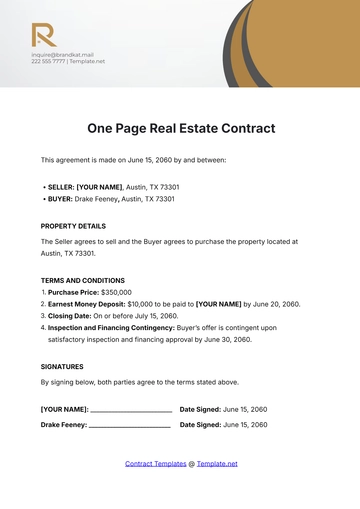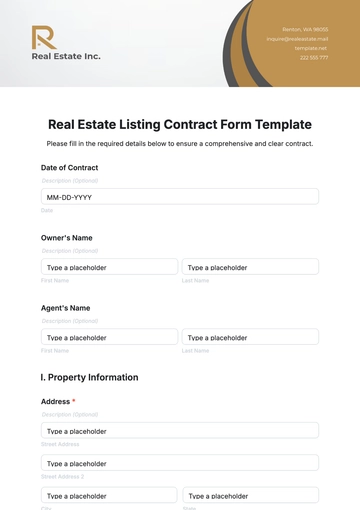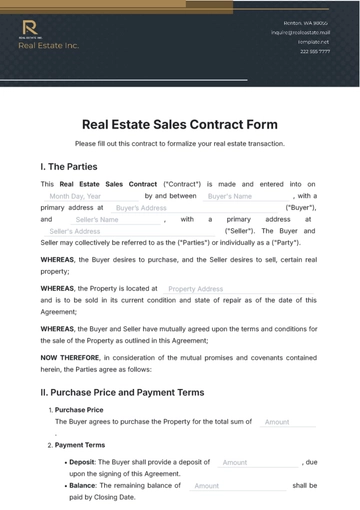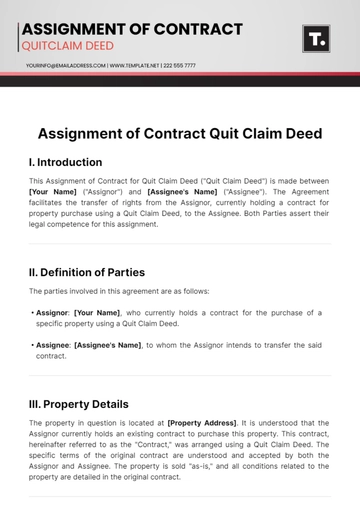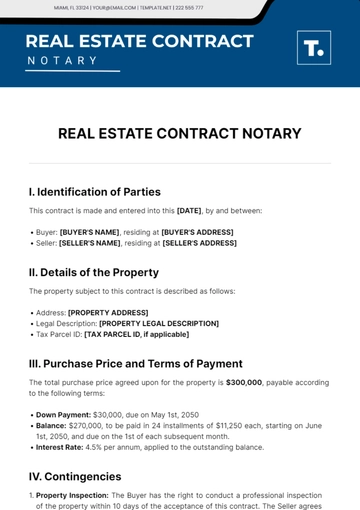Free Real Estate Extend or Amend Contract
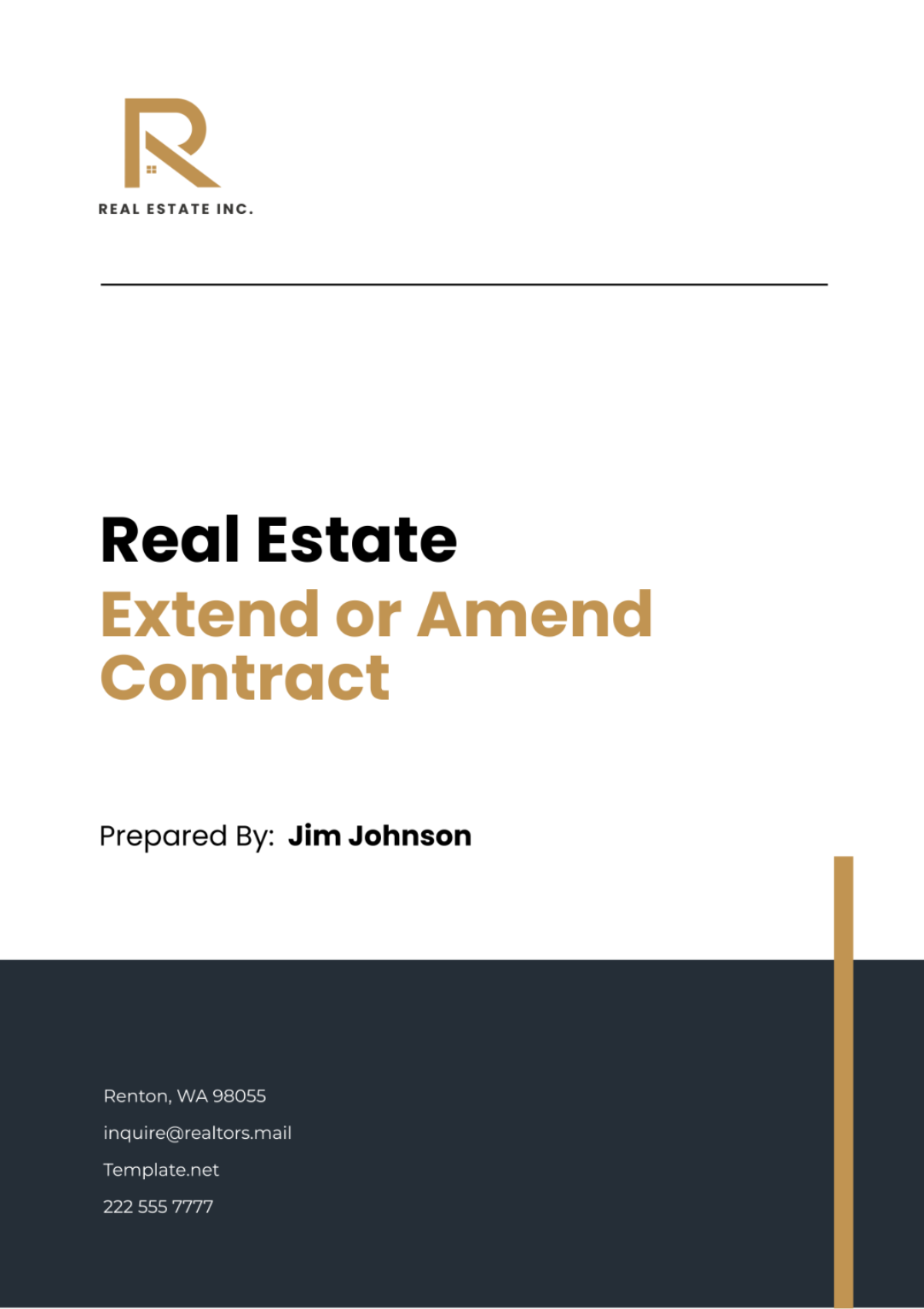
This Agreement is entered into this [Day] of [Month], [Year], the "Effective Date" by and between [Your Company Name], with its principal place of business at [Your Company Address], hereinafter referred to as the "First Party," and [Second Party Name], with its primary residence or primary place of business at [Second Party Address], hereinafter referred to as the "Second Party," collectively referred to as the “Parties”.
WHEREAS, the First Party and the Second Party entered into a Real Estate Contract on [Month Day, Year], which outlined the terms and conditions of the lease of the property;
WHEREAS, over the course of the lease term, certain circumstances have changed that necessitate the modification and amendment of the original Real Estate Contract;
WHEREAS, both parties have mutually agreed to modify, amend, and extend the original Real Estate Contract to better suit their evolving needs and circumstances;
NOW THEREFORE, in consideration of the mutual covenants contained herein and for other good and valuable consideration, the receipt and sufficiency of which is hereby acknowledged, the Parties agree to modify, amend, and extend the original Real Estate Contract as outlined in the following sections of this Agreement:
I. Purpose Of Agreement
A. Modification of Terms
The Parties agree to modify the following terms and conditions of the original Real Estate Contract:
Term of Lease: The original lease term will now be extended. This extension has been mutually agreed upon by both parties and will take effect immediately upon the execution of this Agreement, providing the Second Party with continued occupancy of the property for the extended period. This extension aims to provide continuity and stability for both parties involved.
Rent Amount: The original monthly rent, which was set at a certain amount, will be increased to a new amount. This increase in rent will take effect from the Effective Date and is due to changes in the market conditions and the increased value of the property. The Second Party agrees to pay the increased rent from the effective date onwards, acknowledging the impact of market forces on rental prices.
Security Deposit: The original security deposit, which was set at a certain amount, will be increased to a new amount. This increased security deposit must be paid by the Second Party by [Month Day, Year]. This increase in the security deposit is to cover potential damages or unpaid rent. The Second Party agrees to pay the increased security deposit by the due date, understanding its role in safeguarding the interests of the First Party.
Property Maintenance: The responsibility for property maintenance, which was originally held by the Second Party, will now be transferred to the First Party. This includes, but is not limited to, regular upkeep, minor repairs, and routine maintenance tasks. The First Party agrees to undertake all these responsibilities from the effective date, ensuring that the property remains in a good state of repair and habitability.
B. Amendment of Contract
The Parties agree to amend the original Real Estate Contract as follows:
Maintenance Responsibilities: The First Party, previously not responsible for maintenance, will now be responsible for all minor repairs and maintenance of the property. This includes, but is not limited to, regular upkeep, minor repairs, and routine maintenance tasks. The First Party agrees to undertake these responsibilities and ensure that the property is kept in a good state of repair, providing a comfortable living environment for the Second Party.
Insurance Requirement: The Second Party is now required to maintain a renter’s insurance policy with a minimum coverage of a certain amount. This policy must cover potential damages to the property and personal liability. The Second Party agrees to maintain this insurance policy and provide proof of the same to the First Party, ensuring that both parties are protected against unforeseen circumstances.
Late Payment Penalty: The original contract stipulated a late payment penalty of [5%] of the monthly rent. This amendment changes the late payment penalty to [10%] of the monthly rent. The Second Party agrees to pay this penalty if the rent is not paid by the due date, acknowledging the importance of timely payments in maintaining a good landlord-tenant relationship.
Termination Clause: The original contract allowed for termination under certain conditions. This amendment changes the termination conditions to new conditions. Both parties agree to these new termination conditions, understanding that they provide a fair and equitable means of ending the lease agreement when necessary.
II. Terms Of Amendment
The First Party and the Second Party hereby agree to amend the Contract as follows:
A. Extension Terms
Extension Period: The original contract, set to expire on [Month Day, Year], will now be extended for a period of a certain duration, ending on [Month Day, Year]. Both parties agree to this extension and the Second Party agrees to continue to fulfill its obligations under the contract for the extended period, providing continuity and stability for both parties.
Extension Conditions: The conditions under which the contract is extended remain the same as in the original contract, except for those explicitly modified in this Agreement. Both parties agree to these extension conditions, understanding that they provide a clear framework for the extended lease period.
Acceptance of Extension: Both parties agree to the extension and commit to fulfill their respective obligations during the extension period, acknowledging the mutual benefits of continuing the lease agreement.
B. Amendment Terms
Amendment Scope: The amendments made in this Agreement apply to all clauses and provisions of the original contract, except where they contradict the amendments explicitly made in this Agreement. Both parties agree to these amendments, understanding that they provide a more suitable framework for their ongoing relationship.
Amendment Acceptance: Both parties agree to the amendments and commit to fulfill their respective obligations under the amended terms, acknowledging that these amendments serve to improve the terms of the lease agreement.
Amendment Effect: The amendments made in this Agreement supersede any conflicting terms and conditions in the original contract, providing a clear and updated framework for the lease agreement.
III. Original Contract
A. Continuation of Terms
Existing Provisions: Except as specifically amended by this Agreement, the terms and conditions of the original Contract shall remain in full force and effect. This ensures that the integrity of the original Contract is maintained while accommodating the necessary changes.
Unaltered Clauses: Any clauses or conditions not explicitly modified in this Agreement will be governed by the stipulations of the original Contract. This means that all the provisions of the original Contract, unless otherwise stated in this Agreement, will continue to regulate the relationship between the Parties.
Obligations: Both parties agree to uphold and abide by the terms and conditions of the original Contract that are not altered by this Agreement. This commitment ensures that the Parties remain bound by the terms of the original Contract that have not been changed.
Consistency: The Parties agree that the modifications in this Agreement are consistent with the spirit and intent of the original Contract. This ensures that the changes are in line with the original objectives of the Contract.
Validity: The Parties affirm that the original Contract remains valid and enforceable, except where it contradicts this Agreement. This means that the original Contract continues to be legally binding, except for the specific terms that have been amended by this Agreement.
B. Acknowledgment of Original Contract
Understanding of Terms: Both parties acknowledge that they have read, understood, and agreed to the terms and conditions of the original Contract.
Validity of Original Contract: This Agreement serves to amend certain terms of the original Contract, but does not invalidate or replace the original Contract.
Acceptance: Both Parties affirm their acceptance of the original Contract and its amendments as outlined in this Agreement. This affirmation is important as it signifies the Parties’ agreement to the changes made to the original Contract.
Legal Standing: Both Parties acknowledge that the original Contract, as amended by this Agreement, has legal standing. This means that the amended Contract is legally binding and enforceable.
Enforceability: Both Parties agree that the original Contract, as amended by this Agreement, is enforceable under the law. This means that the Parties can be held legally accountable for any breach of the amended Contract.
C. Effect of Modifications
Impact on Original Contract: The modifications made in this Agreement will be incorporated into the original Contract and will take effect from the date of this Agreement.
Compliance with Modified Terms: Both parties agree to comply with the modified terms and conditions of the Contract as outlined in this Agreement. This commitment is crucial for the smooth implementation of the changes.
Legal Consequences: Both Parties understand that failure to comply with the modified terms and conditions may result in legal consequences. This understanding is important as it underscores the obligations under the amended Contract.
Resolution of Ambiguities: In case of any ambiguity between the original Contract and this Agreement, the terms of this Agreement will prevail. This provision ensures that any potential conflicts between the original Contract and this Agreement are resolved in favor of this Agreement.
IV. Binding Effect
A. Parties Bound by the Agreement
Binding Agreement: This Amendment shall be binding upon and inure to the benefit of the Parties and their respective heirs, executors, administrators, successors, and assigns. This means that the Agreement is not only binding on the Parties but also on their legal representatives and successors.
Application to Relevant Parties: The changes stipulated in this Agreement apply to all relevant parties, including but not limited to the First Party, the Second Party, and any involved third parties.
Responsibility: All Parties are responsible for fulfilling their obligations under this Agreement. This responsibility is crucial for the effective implementation of the Agreement.
Legal Obligation: All Parties understand that this Agreement creates a legal obligation for them. This understanding is important as it underscores the seriousness of the obligations under the Agreement.
B. Legal Successors
Binding on Successors: This Agreement shall also apply to and bind the legal successors of both parties, ensuring that the terms of the Agreement continue to be upheld in the event of a change in the legal status of either party. This provision ensures the continuity of the Agreement in the event of a change in the legal status of either party.
Continuity: This clause ensures the continuity of the Agreement in the event of a change in the legal status of either party. This means that the Agreement will continue to be in effect even if one of the Parties undergoes a legal change, such as a merger or acquisition.
Notification: Any legal successor of either party is required to notify the other party of their new status. This notification is important to ensure that all Parties are aware of any changes in the legal status of the Parties.
Acceptance of Terms: Any legal successor of either party is deemed to have accepted the terms of this Agreement. This means that any legal successor is bound by the terms of this Agreement, just as the original Parties were.
C. Enforcement of Agreement
Legal Enforcement: Both parties agree that this Agreement is legally enforceable and commit to fulfilling their respective obligations as outlined in this Agreement. This commitment is crucial for the effective implementation of the Agreement.
Remedies for Breach: In the event of a breach of this Agreement, the non-breaching party has the right to seek legal remedies as provided by law. This provision ensures that the non-breaching party can seek redress in the event of a breach of the Agreement.
Jurisdiction: Both parties agree that any legal action arising from this Agreement will be filed in a court of competent jurisdiction. This provision ensures that any legal disputes arising from the Agreement will be resolved in a court that has the authority to hear the case.
Legal Costs: In the event of a legal dispute arising from this Agreement, the prevailing party is entitled to recover its legal costs from the non-prevailing party. This provision ensures that the party that wins a legal dispute can recover its legal costs.
Waiver of Breach: A waiver of a breach of any term in this Agreement does not constitute a waiver of any other term. This provision ensures that a party cannot use a waiver of one breach to excuse future breaches of the same or any other term.
V. Dispute Resolution
A. Amicable Settlement
Initial Resolution: Any dispute arising out of or in connection with this Contract shall first be attempted to be settled amicably between the Parties. This may involve direct negotiation or mediation. Both parties agree to participate in good faith in this informal dispute resolution process before resorting to formal legal proceedings.
Good Faith Negotiations: Both parties agree to act in good faith and make a genuine effort to resolve any disputes before resorting to formal legal proceedings. This includes open communication, cooperation in providing necessary information, and a willingness to consider reasonable solutions proposed by the other party.
Mediation: If the Parties cannot resolve the dispute through negotiation, they agree to attempt to resolve the dispute through mediation before resorting to arbitration or litigation. The mediator will be a neutral third party agreed upon by both parties, and the cost of mediation will be shared equally.
Timeframe for Mediation: The Parties agree to complete the mediation process within a reasonable timeframe, typically not exceeding 60 days from the date the dispute was first raised.
Outcome of Mediation: If the mediation process results in a mutually agreed upon solution, the Parties will document and sign an agreement detailing the terms of the solution.
B. Arbitration
Arbitration Proceedings: If an amicable settlement cannot be reached, the dispute shall be settled by arbitration as agreed upon between the Parties. The arbitration will be conducted by a neutral arbitrator agreed upon by both parties.
Finality of Decision: The decision of the arbitrator(s) shall be final and binding on both parties, and both parties agree to accept and abide by the decision. The arbitrator’s decision will be based on the terms of this Agreement and applicable law.
Confidentiality of Proceedings: All arbitration proceedings will be confidential, and the Parties agree not to disclose any information about the proceedings or the decision, except as required by law or necessary to enforce the decision.
Costs of Arbitration: Unless otherwise decided by the arbitrator(s), each party will bear its own costs of arbitration. The arbitrator(s) may, at their discretion, order the losing party to pay the winning party’s costs.
Enforcement of Award: The Parties agree to abide by and implement the award rendered by the arbitrator(s). If necessary, the award may be enforced by any court having jurisdiction over the party against whom enforcement is sought.
C. Legal Proceedings
Last Resort: If the dispute cannot be resolved through arbitration, either party may choose to take the matter to court. The parties agree to accept the jurisdiction of the court and to abide by the court’s decision.
Legal Costs: Each party will bear its own costs in relation to any legal proceedings. However, the court may order the losing party to pay the winning party’s legal costs.
VI. Governing Law
A. Jurisdiction
Applicable Law: This Amendment shall be governed by and construed in accordance with the laws of [State/Country Name]. This means that the interpretation and enforcement of this Agreement shall be governed by the laws of [State/Country Name], ensuring that the Agreement is consistent with the legal standards and principles of the specified jurisdiction.
Legal Interpretation: Any ambiguities in this Agreement will be interpreted in accordance with the laws of [State/Country Name], without regard to its conflict of law principles. This ensures that any unclear terms or provisions in the Agreement are clarified according to the legal norms of the specified jurisdiction.
Consistency with Local Law: The Parties agree to abide by the laws of [State/Country Name] in their performance of this Agreement, ensuring that their actions are in compliance with local legal requirements.
B. Compliance
Legal Obligations: Both Parties agree to comply with all applicable laws and regulations of [State/Country Name] in their performance of this Agreement. This includes, but is not limited to, laws related to property leasing, contract enforcement, and dispute resolution.
Legal Actions: Any legal actions, suits or proceedings arising out of this Agreement will be in the courts of [State/Country Name], and the Parties consent to such personal and exclusive jurisdiction. This ensures that any legal disputes will be resolved within the legal framework of [State/Country Name].
Adherence to Laws: The Parties agree to conduct all activities related to this Agreement in a manner that is consistent with the laws of [State/Country Name], thereby ensuring that all actions taken are legal and valid.
Respect for Legal Authority: The Parties acknowledge the authority of the courts of [State/Country Name] and agree to abide by any decisions or judgments made by these courts in relation to this Agreement.
C. Disputes
Resolution: In the event of a dispute arising out of this Agreement, the Parties agree to seek resolution in accordance with the laws of [State/Country Name].
Legal Remedies: The Parties acknowledge that any breach of this Agreement may result in irreparable harm, and agree that in addition to any other remedies available at law or in equity, the aggrieved Party will be entitled to seek injunctive relief without the necessity of posting a bond.
Legal Consequences: The Parties understand that failure to comply with the terms of this Agreement may result in legal consequences under the laws of [State/Country Name].
VII. Entire Agreement
A. Agreement Components
Inclusive of Original Contract: This Amendment and the original Contract constitute the entire agreement between the Parties. This means that the original Contract and this Amendment contain all the promises, representations and understandings between the Parties and supersede all prior promises, representations and understandings, either oral or written.
Precedence: In the event of any inconsistency or conflict between the original Contract and this Amendment, the terms of this Amendment will prevail.
Comprehensive Agreement: This Agreement, along with the original Contract, provides a comprehensive outline of the rights, responsibilities, and obligations of each Party.
B. Modifications
Written Requirement: Any modifications to this Agreement must be in writing and signed by both Parties to be effective. This ensures that any changes to the Agreement are documented and mutually agreed upon.
Mutual Agreement: Changes to this Agreement can only be made by mutual agreement of both Parties.
Documentation of Changes: Any changes to this Agreement will be documented in a new amendment, which will be signed by both Parties and attached to this Agreement.
C. Severability
Validity of Provisions: If any provision of this Agreement is found to be invalid or unenforceable, the remainder of the Agreement will continue in full force and effect.
Replacement of Provision: Any invalid or unenforceable provision will be deemed severed from this Agreement to the extent of its invalidity or unenforceability, and the Parties will negotiate in good faith to replace such provision with a valid and enforceable provision that achieves the same economic effect.
Continued Effect: Despite the severance of any provision, the rest of the Agreement will continue to be in effect, ensuring that the Parties are still bound by the remaining provisions.
D. Waiver
Non-Waiver: Failure by either Party to enforce any provision of this Agreement will not be deemed a waiver of future enforcement of that or any other provision. This ensures that the Parties cannot ignore or bypass the Agreement’s provisions.
Written Waivers: Any waiver of any provision of this Agreement must be in writing and signed by the Party waiving its rights. This ensures that any waivers are documented and cannot be disputed later.
VIII. Signatures
IN WITNESS WHEREOF, the Parties have executed this contract as of the Agreement Date.
First Party

[Authorized Representative Name]
[Your Company Name]
Date: [Month Day, Year]
Second Party

[Second Party Name]
Date: [Month Day, Year]
- 100% Customizable, free editor
- Access 1 Million+ Templates, photo’s & graphics
- Download or share as a template
- Click and replace photos, graphics, text, backgrounds
- Resize, crop, AI write & more
- Access advanced editor
Amend or extend your contracts precisely with our Real Estate Extend or Amend Contract Template! This fully editable and customizable contract from Template.net ensures you capture every important detail. Make editing convenient with AI Editor Tool, allowing you to provide a clear and comprehensive contract amendment or extension easily!
You may also like
- Rental Contract
- Contractor Contract
- Contract Agreement
- One Page Contract
- School Contract
- Social Media Contract
- Service Contract
- Business Contract
- Restaurant Contract
- Marketing Contract
- Real Estate Contract
- IT Contract
- Cleaning Contract
- Property Contract
- Supplier Contract
- Partnership Contract
- Food Business Contract
- Construction Contract
- Employment Contract
- Investment Contract
- Project Contract
- Payment Contract
- Student Contract
- Travel Agency Contract
- Startup Contract
- Annual Maintenance Contract
- Employee Contract
- Gym Contract
- Event Planning Contract
- Personal Contract
- Nursing Home Contract
- Law Firm Contract
- Work from Home Contract
- Software Development Contract
- Maintenance Contract
- Music Contract
- Amendment Contract
- Band Contract
- DJ Contract
- University Contract
- Salon Contract
- Renovation Contract
- Photography Contract
- Lawn Care Contract




